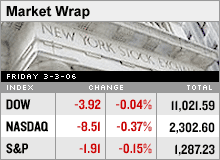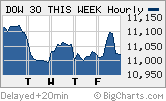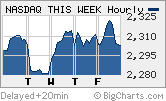|
Mixed day, mixed week
Major stock gauges abandon rally attempt, end with little to show; Nasdaq declines on chip selloff.
NEW YORK (CNNMoney.com) - The stock market ultimately succumbed to tech weakness Friday, at the end of a choppy session in which investors worked to set aside a profit warning from Intel and a jump in bond yields. The Dow Jones industrial average (down 3.92 to 11,021.59, Charts) ended barely lower and the Standard & Poor's 500 (down 1.91 to 1,287.23, Charts) index lost a few points.
The tech-heavy Nasdaq composite (down 8.51 to 2,302.60, Charts) lost 0.3 percent. For the week, the Dow and S&P slipped and the Nasdaq gained. Stocks had fallen in the morning after Intel's profit warning and in response to a jump in bond yields, but the market stabilized near midday and eventually tried to rally. The attempt petered out in the last hour of trade, as a selloff in technology weighed on overall sentiment. Nonetheless, the overall declines were pretty moderate, considering Intel's influence. "Intel and a Barron's online article about slower PC sales hit the techs in the morning, but I don't think they said anything that hasn't been said or hinted at recently," said Tom Schrader, managing director of listed trading at Legg Mason. The market may have also been protected Friday from bigger losses by the morning's strong economic news and a broader optimism that seems to be in place recently, said Peter Cardillo, chief market analyst at S.W. Bach & Co. Generally, "the undertone remains quite strong," Cardillo said. "The market is looking ahead and is expecting stronger economic growth after a weaker fourth quarter." Next week brings reads on fourth-quarter productivity, the January trade balance and the February employment report. One stock likely to be active Monday is Research in Motion, maker of the Blackberry wireless e-mail device. After the close Friday, it was announced that the company has settled its dispute with patent holding company NTP, therefore avoiding a shutdown of Blackberry service. Research in Motion (Research) shares rallied 19 percent in extended-hours trade. Friday's movers
Intel (down $0.17 to $20.32, Research) fell about 0.8 percent after it warned that first-quarter revenue will miss an earlier forecast due to weaker-than-expected demand and a modest loss in market share. Yet, the news didn't spark a broad selloff in technology, as some had expected. The broader chip sector see-sawed across the unchanged line throughout the session, before sliding in the last hour. The Philadelphia Semiconductor (down 8.51 to 537.78, Charts) index, or the SOX fell 1.6 percent. Dell (down $0.43 to $29.13, Research) and Hewlett-Packard (down $0.93 to $33.26, Research) were hit harder than Intel and the chips, following the article in Barron's. Also weighing on the tech sector: software maker Novell, which warned late Thursday that fiscal second-quarter earnings will miss forecasts. That overshadowed the company's report of higher-than-expected first-quarter earnings. Novell (down $1.63 to $7.90, Research) shares fell more than 17 percent. On the upside, networking equipment maker Finisar (up $1.17 to $4.08, Research) jumped over 40 percent after reporting earnings late Thursday that topped expectations and reversed a loss from a year ago. Among the decliners, home building shares were under pressure, with the Dow Jones Home Construction (down $16.45 to $872.54, Research) index falling nearly 2 percent. The Dow saw the smallest declines of the major gauges. Boeing (up $0.59 to $73.39, Research), Pfizer (up $0.28 to $26.34, Research), General Electric (up $0.21 to $33.06, Research) and Alcoa (up $0.50 to $30.40, Research) all gained. Market breadth turned negative. On the New York Stock Exchange, losers beat winners by more than nine to seven on volume of 1.56 billion shares. On the Nasdaq, decliners topped advancers by four to three on volume of 2.44 billion shares. Stocks posted modest losses Thursday in response to a jump in crude oil prices and bond yields, and a spate of weak February retail sales reports. Services sector expands
Investors also took in a pair of economic reports. The Institute for Supply Management's index on the service sector jumped to 60.1 in February, topping the forecasts of economists surveyed by Briefing.com and jumping from the previous month. Any reading above 50 points to expansion in the sector, which accounts for about three-quarters of the U.S. economy. The University of Michigan's last revision of its February consumer sentiment index fell to 86.7 from 91.2 in late January and 87.4 in early February. Economists thought it would be revised up to 88.0 U.S. light crude oil for April delivery added 31 cents to settle at $63.67 a barrel on the New York Mercantile Exchange. Treasury prices slumped for a second session, raising the yield on the 10-year note to around 4.68 percent, near the highest in a year, from 4.63 percent late Friday. Treasury prices and yields move in opposite directions. Weighing on the bond market: news that the European Central Bank raised a key short-term interest rate Thursday to the highest point in three years, and concerns that Japan may raise rates too. In currency trading, the dollar was little changed versus the euro and higher versus the yen. COMEX gold for April delivery fell $2.40 to $568 an ounce. _______________
Click here for the latest business news. |
|








